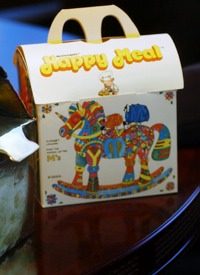
While conservatives prevailed in the elections on Tuesday, liberals on San Francisco’s Board of Supervisors voted 8-3 to approve an ordinance that would limit toy giveaways in fast-food children’s meals that have excessive calories, sodium, and fat. The ordinance also demands that fast-food children’s meals include servings of fruits or vegetables. To boot, the ordinance includes an amendment that would restrict restaurants’ free speech or advertising.
The Blaze reports, “If it survives an expected veto from Mayor Gavin Newsom, San Francisco would become the first major city in the country to pass such a law aimed at curbing childhood obesity. It would go into effect December 2011 if supervisors again approve it after Newsom’s veto.”
California’s Santa Clara County has approved a similar ordinance, affecting over a dozen restaurants.
According to the Christian Science Monitor, the ordinance does not specifically reference McDonald’s but very clearly targets the Happy Meal, beloved by children for 31 years.
Likewise, the measure doesn’t exactly ban the toys, but says that they cannot be included with meals that fail to meet nutritional requirements for fat, calories, and sodium levels.
Ken Yeager, president of the Santa Clara County board of supervisors, explains, “The ordinance is very clear. We don’t say that you can’t hand out toys, but we set out certain nutritional guidelines that have to be met before the toys can be given out.”
The Christian Science Monitor elaborates, “The ordinance, as proposed, said restaurants will be allowed to offer free toys, trading cards, admissions tickets, or other treats only with meals containing fewer than 600 calories, fewer than 640 milligrams of sodium, less than 35 percent of calories from fat, and less than 10 percent saturated fat. The meal must also include at least a half-cup of fruits or veggies, and can’t come with fatty or sugary drinks.”
Those involved in the passage assert that the measure should help to curb childhood obesity, and have expressed hopes that the measure would be adopted by other cities and states, and eventually become federal law.
Supervisor Eric Mar, who proposed the law, declares, “From San Francisco to New York, the epidemic of childhood obesity in this country is making people sick, making our kids sick, particularly kids from low-income neighborhoods.”
Stephen Gardner, litigation director of the Center for Science in the Public Interest (CSPI), called McDonald’s “the stranger in the playground handing out candy to children.” CSPI threatened to sue McDonald’s in June if they did not stop using toys to attract children.
McDonald’s responded to threats from CSPI and Santa Clara by providing healthier options on the menu, include apple slices with caramel sauce and low-fat milk. In fact, the most nutritious Happy Meal features chicken nuggets, apple slices, and milk and is 390 calories, with 15 grams of fat, and 560 milligrams of sodium. However, that meal fails to meet the requirement needed in order to hand out a toy, as 37 percent of the calories in the meal come from fat.
Following the threat of a lawsuit, McDonald’s defended allegations that it did not care about children by pointing to its long history of supporting Ronald McDonald houses and arguing that they had popular opinion on their side.
CEO Jim Skinner emphasized in a statement, “At McDonald’s, we listen to what our customers tell us. For the past 30 years they have told us — again, overwhelmingly — that they approve of our Happy Meal program. Three decades provide a lot of listening time.”
McDonald’s views the measure as further governmental overreach, and contends that the law will “take the joy out of the Happy Meal.” Representatives from McDonald’s Corporation disparaged the vote outside of the lawmakers’ chambers at City Hall, asserting that the law will threaten business and restrict parents’ ability to make choices for their children.
Scott Rodrick, owner and operator of 10 McDonald’s restaurants in the city, indicated after the vote that “there will be sales loss, there may be jobs impacted, and I know the city of San Francisco will lose tax income to people wanting a McDonald’s experience without government intervention.”
According to the Blaze, “Rodrick said none of his current menu items would be allowed under the nutritional guidelines in the ordinance. Those standards have been criticized by the company, who said proponents lack the evidence to support the claim that they would help reduce obesity.”
Rodrick, however, is encouraging McDonald’s patrons in San Francisco to circumvent the law: “Someone doesn’t have to travel very far — a mile outside San Francisco — to get the traditional McDonald’s Happy Meals experience.”
Some San Francisco residents seem to be in favor of the new ordinance. Concepcion Dawes, a 20-year-old mother of a two-year-old, for example, comments, “Fast food is really fattening, and it’s really addicting, and sometimes it’s hard to tell a child no.”
McDonald’s spokesperson Danya Proud claims that overall parents are unhappy about the law:
We are extremely disappointed with the decision. It’s not what our customers want. Parents tell us it’s their right and responsibility — not the government’s — to make their own decisions and to choose what’s right for their children…. Getting a toy with a kid’s meal is just one part of a fun, family experience at McDonald’s.
Since 1979, McDonald’s has sold 20 billion Happy Meals. Likewise, 93 percent of Happy Meals continue to be sold with french fries, though apple slices are available as a side option, indicating once more that perhaps the San Francisco law is opposed to the wishes of most parents and their children.
Photo: AP Images




